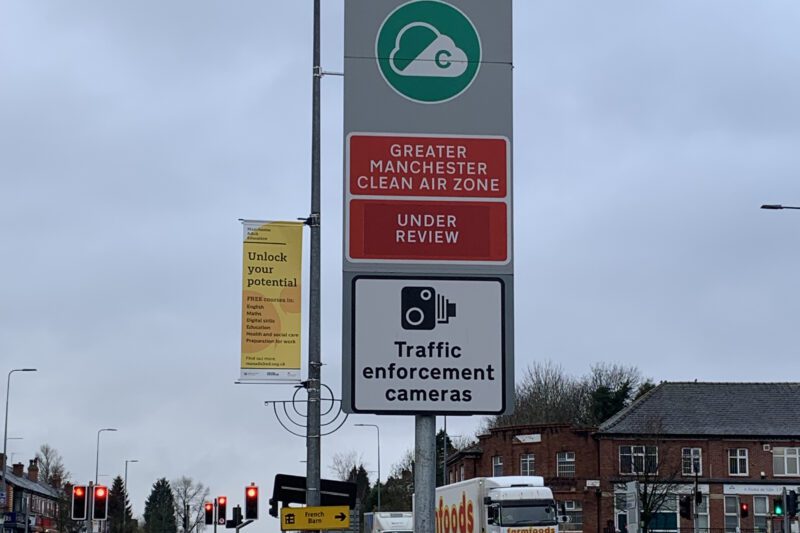City leaders believe investing in greener vehicles is the way to cut pollution, rather than pricing drivers of older vehicles off the roads with clean air zones.
U-turn
If approved, the U-turn over Manchester’s Clean Air Zone plan could see millions of pounds made available for greener taxis and commercial vehicles. At the same time, no one will be charged or fined for driving on the region’s roads in older, more polluting vehicles. Instead, they will be offered financial help to upgrade their existing cars, vans and buses.
Huge public backlash led Manchester’s leaders to put the brakes on the original plans, which would have seen the drivers of non-compliant taxis, vans, buses, lorries and coaches being charged £60 a day to drive in the proposed Clean Air Zone from June, 2022.
This gave taxi drivers two choices. While still struggling to recover from the legacy of the pandemic, they either had to fork out for a compliant, greener vehicle while still paying off their existing petrol or diesel taxi or PHV.
Or, if they kept their existing vehicle, they would have to put up prices to cover the daily £60 charge for driving in Manchester’s CAZ, on top of rising fuel and taxi insurance.
The controversial Greater Manchester-wide scheme was put on hold and Clean Air Greater Manchester is now waiting on the green light from the Government for its latest plans which call for investment into greener transport, and do not include any charging zones.
Going green
Under the plan, the city region is proposing a £22.5m Clean Taxi Fund to provide grants of between £3,770 and £12,560 to help all taxis (Hackney Carriages and Private Hire Vehicles) licensed with a Greater Manchester authority to meet a new minimum emission standard by December 31, 2025.
An £8 million Electric Hackney Upgrade Fund will also provide grants of between £7,530 and £12,560 to help owners of GM-licensed Hackneys who meet the minimum emission standard to help upgrade to a zero-emission capable vehicle.
Busy Bees
But the biggest change will be seen on the buses, with £51.2 million for zero-emission electric buses for the Bee Network.
In September, the region’s bus network was brought back under public control with 64 new zero-emissions Bee buses, which are being seen as the future for public transport. This game-changing move has helped put the combined authority back in the driving seat to tackle pollution, as reported by TaxiPoint.
Clean Air Greater Manchester says this allows zero-emissions buses to be used on routes where they can have the biggest impact on improving air quality, with the goal of an all-electric fleet by 2032.
Making progress
Greater Manchester Mayor Andy Burnham said: “Cleaning up the air that people breathe is a priority for Greater Manchester and we have already started to do that through investment in the Bee Network, which saw the first buses brought back under local control in September.
“By accelerating investment in the Bee Network to create a London-style integrated public transport network, and upgrading GM-licensed taxis, we can improve air quality faster than if we introduced a Clean Air Zone, and without causing hardship to our residents or businesses.”
The Government’s decision is expected early this year.
If Greater Manchester’s plan is approved, it could pave the way for other regions with clean air zones, low-emissions zones and ultra-low emissions zones to rethink their approaches.


